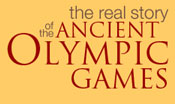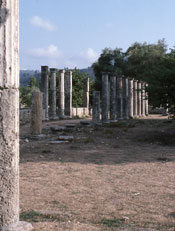
THE
GLOSSARY
altis: grove
athlete: one who competes for a prize
athlon: prize
athlos: contest
dekadrachm: ten drachmai
diaulos: a foot race equal to two lenghts of the stadion
dolichos: a distance race varying from place to place, generally 12
to 24 lengths of the stadion (ca. 1.5 to 3 miles)
drachma: standard of Greek currency, meaning literally "a handful
of spits"
dromos: running place or racecourse
gymnasion: place of naked people
halteres: jumping weights
hellanodikai: Greek judges
himantes: boxing gloves
hippodromos: racecourse for horses
hoplite: armed soldier
hoplitodromos: race in armor
keles: horse race
Nike: Victory; goddess of victory
palaestra: place of wrestling
pale: wrestling
pankration: an athletic event combining aspects of wrestling and boxing
pantheon: all the gods
pentathlon: five contests (discus, javelin, long jump, wrestling, and
foot race)
peplos: a loose outer robe worn by women in ancient Greece
periodonikes: circuit victor
pugme: boxing
stadion: linear distance equal to 600 feet; a foot race 600 feet long;
place of athletic contests, literally "the standing place"
tethrippon: four-horse chariot
tetradrachm: four drachmai
Did
you know...
"Olympos"
vs. "Olympia...
Mt. Olympos is a mountain in northern Greece, located on the border
between Macedonia and Thessaly. It is the tallest mountain in Greece,
elevation 2917 m (9570 feet). In Greek mythology Mt. Olympos was the
home of the Greek pantheon of Greek gods and goddesses, the “12
Olympian deities.”
Olympia (shown below) was a rural sanctuary in the Western Peloponnesos
dedicated to Zeus. It was located 15 km. (7 miles) from the Ionian
Sea. The sanctuary was located near the meeting of the Alpheus and
Kladeos rivers at the base of the Hill of Kronos.

